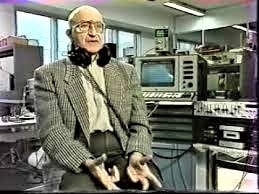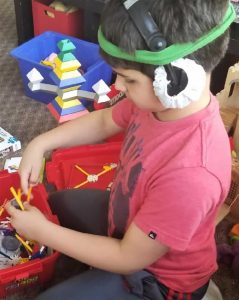Do You Or Your Child Have Trouble Following Along In Conversations?
Is it hard for you to pay attention when people are speaking to you? Maybe you’ve had trouble following spoken directions since childhood. Or perhaps you hesitate to volunteer for extra assignments or projects at work because you’re worried that you will mess up a step that everyone else seems to understand.

Does your child struggle to recall details they’ve heard? Do you feel like they never listen to your instructions? Despite normal hearing test results, your child may constantly ask you to repeat yourself. Perhaps it seems like you can never hold their attention. Or you’ve noticed they seem overly tired after school, making it difficult for them to focus and engage in family time in the evenings.
Regardless if you are a child or adult, auditory processing issues can affect you at any age and make it difficult for you to listen and comprehend spoken words even when your hearing is fine. As a therapist, I specialize in auditory processing issues and can teach your brain to relearn listening skills to help you feel capable of reaching your goals.
Auditory Processing Disorder (APD) Is More Common Than Previously Thought
In past decades, children who struggled with inattention and listening skills were often diagnosed with ADHD or learning disorders like dyslexia. It’s true that ADHD or dyslexia and auditory processing disorder can often exist concurrently—which can sometimes lead to therapists missing the unique characteristics of APD.
Researchers now know that APD has its own unique characteristics and that it can affect both children and adults alike¹. However, many still aren’t aware of everything the disorder entails. Some symptoms, like recurring ear infections, typically don’t get connected to auditory processing. And often, even if inattention or difficulty following instructions is recognized in a child, these issues are pushed to the side in the hopes the child will grow out of it.
The Challenges When APD Goes Unrecognized

When auditory processing disorder is undiagnosed, many people develop their own coping mechanisms for the challenges it presents. For example, in school, they might teach themselves to take fast notes to be sure they won’t miss anything. On the other hand, some children who struggle to keep up may turn to disruptive behavior or daydreams in class because they don’t understand why they’re disconnected from everything going on around them.
If you or your child has an auditory processing disorder, trying to compensate without the support of an expert could mean you’re working much harder than your peers to get to the same level. Therapy for your auditory processing disorder can even the playing field and enable you to reclaim your time and energy.
Treatment For APD Can Help Improve Your Quality Of Life

Improving your whole life by addressing your auditory issues may seem like wishful thinking, but with the specialized sound therapy for auditory processing disorder, it is possible. We can help you engage your own neuroplasticity—which is the brain’s ability to adapt and change—to retrain the path that leads from your ear to your brain and help you develop your auditory processing skills.
Therapy for auditory processing disorder will benefit other aspects of behavior, too. For instance, it can help your child with their emotional regulation and inattention. Not to mention, treatment can also help you both improve your social interactions and learning abilities.
As you gain more cohesive listening skills, you will become more confident in your social and professional lives. Your child can feel connected to their friends and begin living up to their potential in school. In fact, most people have never explored the full possibilities of their innate resources. Even if your basic auditory processing is well developed, therapy can still help you achieve your peak performance.
What To Expect In Therapy

Treatment for APD starts with an in-depth initial consultation. You (or your family, if you’re seeking treatment for your child) will have a conversation with me and undergo testing so we can get a clear picture of how you process information now and how to help you achieve your goals. (If the evaluation shows you need a different type of intervention than what I offer, I will help you get connected with an appropriate provider for whatever you need.)
During our first meeting, you will receive my program recommendations and steps to move forward. I will teach you some immediate, useful strategies to help you manage your auditory processing disorder even before we begin therapy. And, as a parent, you will also learn more about how your child processes information and what strategies might be helpful for them at home and in the classroom.
Throughout the therapy program, I will guide you and I will re-evaluate the progress you’re making in your perceptions so that you can stay on track to meet your goals.
Treatment Modalities For APD Help Train Your Brain
The goal of sound therapy for auditory processing disorder is to help you mature your listening function and develop your perceptions fully. I stay up to date on the newest research and publications to give you the best treatment possible. The program I use consists of a combination of methods, including Dr. Tomatis’ Method of sound training, qEEG swLoRETA Neurofeedback, and other sound training interventions based on the Tomatis Method.
The Dr. Sacarin Listening Center is home to one of four practitioners in the US that are trained in the Listening Approach with Dr. A Tomatis himself. This approach is highly effective in improving listening skills, understanding, and effective communication².
The other method I employ—qEEG swLoRETA Neurofeedback intervention—uses the connection between your body and brain to get feedback that will help you regulate and optimize your brain function and assist in auditory processing. In some cases, qEEG swLoRETA Neurofeedback and Dr. Tomatis’ sound training can be used in combination.
Auditory processing disorder therapy integrates your sensory input—like balance, sight, and touch—with how you process sound, helping you improve the way your brain distills and clarifies sound inputs. As a result, you can expect your self-esteem to improve as you’re able to follow spoken exchanges more easily and make connections that were out of reach before.
You May Still Have Questions About Therapy For Auditory Processing Disorders…
My family has a busy schedule, so how much time will therapy take?
Because treatment for APD involves precise techniques, it can take a considerable amount of time. However, we have an in-depth consultation before your therapy sessions begin, so you will know exactly what to expect. I also break the program into compact training sequences that can fit into your family’s schedule.
What if I don’t respond to the program?
My goal is to evaluate everyone before they start the program to know if they’re a good fit. If the consultation shows this program might not be suited for you, I believe it’s my job to help you find a provider and treatment approach that’s compatible. The program I use has a growing body of clinical evidence to show its effectiveness³. And, throughout the treatment, I monitor your progress and rate of change. This way, I know how your auditory processing is responding to listening therapy every step of the way, ensuring the best results.
My child is reluctant to come to therapy. Is your office welcoming to children?
I understand it can be hard for children to start therapy. That’s why I work hard to make therapy a positive and stimulating experience and ensure everyone is comfortable with a welcoming office space that includes activities to keep children engaged and entertained.
You Can Feel Capable And Connected
If you want to improve your listening skills, your ability to remember what people tell you, and your capability to connect in conversations, you can learn more about how I can help retrain your brain. Call Dr. Sacarin Listening Center for a free, 30-minute phone consultation to discuss treatment options for APD.
¹ https://www.sciencedirect.com/science/article/pii/S1672293017300296
² http://rad-med.com/wp-content/uploads/2020/10/08.pdf
³ https://www.proquest.com/openview/8be5e40124d8f330cd87d1a221f54fd7/1?pq-origsite=gscholar&cbl=18750
